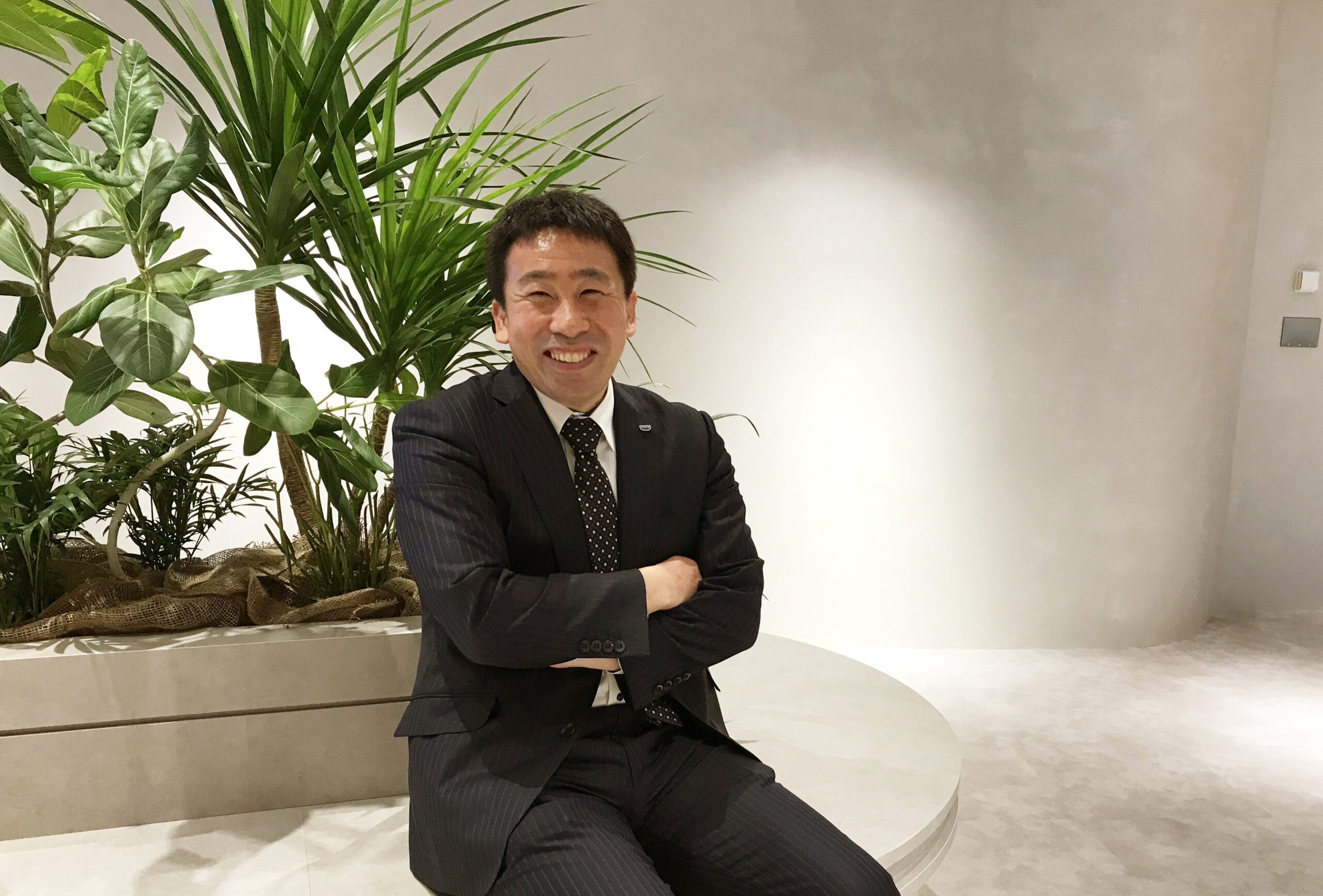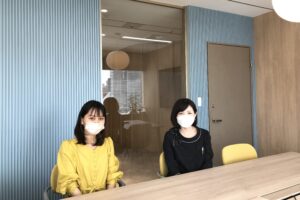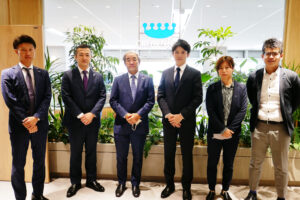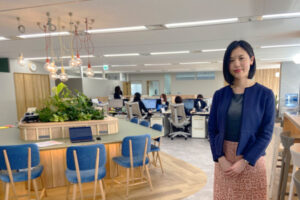When you hear the words “executive officer”, do you have an image of “scary” or “difficult to talk to”? One of the attractions of Kono Seisakusho is that our executive directors completely overturn this image. All of them are strict, but at the same time, they give us proper guidance, which is something that our employees admire. We interviewed them to find out more about their charms and personalities. Our first interview is with Mr. Asaoka, the Executive Officer in charge of “management and pharmaceutical affairs in the manufacturing department.
Born in Tokyo and raised in Tsukuba
Ito: Thank you for your time today. Please tell us where you are from and what you like about the city.
Asaoka: I was born in Tokyo and raised in Tsukuba. I think Tsukuba is attractive because of its lush greenery and spacious, beautiful cityscape. It is a research university city, so it has an academic atmosphere, and I also feel that it is a very good environment for raising children. Bus tours to various research institutes such as JAXA are held during long vacations, and I think it is a place where children can easily become interested in a variety of things.
What I was crazy about when I was a student
Ito: Speaking of Mr. Asaoka, Mr. Asaoka has a strong image of being an all-around sportsman, but what were you involved in when you were a student?
Asaoka: I first played soccer in elementary and middle school, but my enthusiasm for soccer burned out in high school and I put it on hold for a while (laughs). I started competitive skiing seriously in college and became obsessed with Alpine skiing. At that time, I was thinking about skiing all year round. At the time, I had an image of skiing as “beautiful men and women galloping down the ski slope.
Ito: There’s definitely an image of someone running down a ski slope and applying the brakes while making a noise! (laugh)
Asaoka: Right? But once I actually started learning, I realized it was a sparse experience (laughs). From the very first training camp, after we joined the club, we had to go through hard training, climbing, and sliding down steep hills alone.
Ito: So It was extremely hard from the beginning!
Asaoka: I also have memories of a camp where there was no electricity, gas, or running water. It was a survival camp where we cooked rice with firewood, made rice balls together, and drank water from the river.
Ito: This is truly “THE youth”! I also heard that you were actually a former national ski racer!
Asaoka: When I was a graduate student, I thought I would try out for the National Sports Festival, so I entered a qualifying competition. It was a blizzard day, and even the staff wanted to go home early… Moreover, the person with the best historical score skates first (*the rule at that time: skiers who had faster times in the past or who had competed before would skate first). The later the order, the rougher the course would be, and the more disadvantageous it would be, and I thought it would be difficult to make it to the top, but unexpectedly, I came in first place (laughs).
Ito: Wow! That’s amazing!
Asaoka: I was surprised myself (laughs)! I ended up not being able to participate in the National Athletic Meet due to some minor rule issues at the time, and I stayed away from it for a while after that, but I tried again after becoming a working adult. When my child was 3 years old, I participated in the qualifying competition again, and I was very nervous… (laugh)!
I had to change my child’s diaper before the start of the race, and we finished just in time (lol), so I didn’t even have a chance to preview the course. Moreover, Again, the players with good historical results skated first. It had been a long time since I skied seriously, and I was in a slump, So I was surprised to win first place in my age group. By the way, I even risked my life skating through the official race!
Ito: What? That’s amazing…! If you had continued to practice in earnest, what level would you have reached? !!!!
About Hobbies
Ito: Please tell us about your hobbies.
Asaoka: I guess it’s skiing after all. Nowadays, there are convenient apps that can measure the distance skied, maximum speed, and record how many times you have ridden the Surface Lift. I often go skiing with my daughter, but I don’t care about whether she skis well or not (laughs). By the way, I can reach a maximum speed of about 80 km/h in the middle of nowhere!
Ito: Such a convenient app! And at 80 km/h, it’s already highway level!
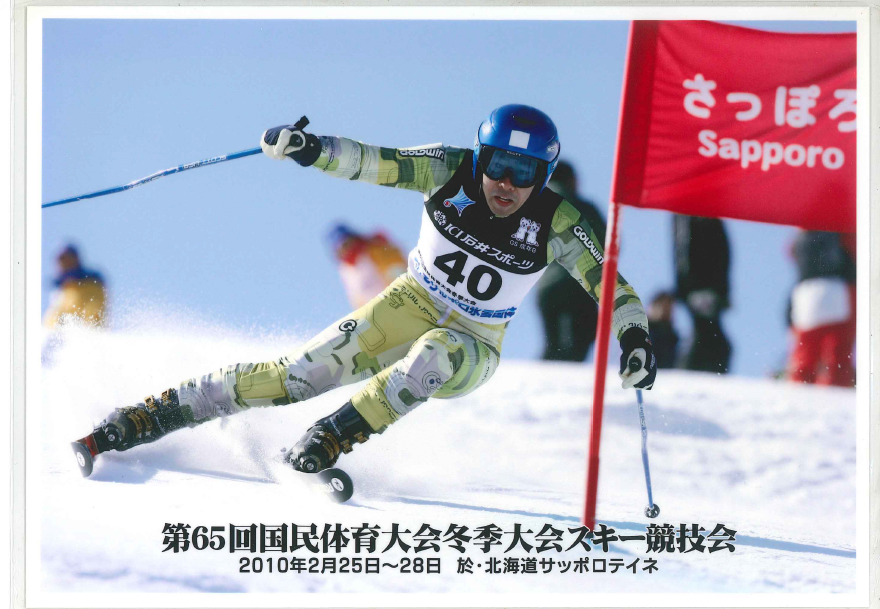
Formerly employed as a production engineer at a pneumatic equipment manufacturer
Ito: What kind of work did you do at your previous job?
Asaoka: I worked as a production engineer at a pneumatic equipment company. I was engaged in the work of production lines that made parts for products, but the scope of my work was wide and many parts could not be done without various kinds of knowledge. I was in charge of various tasks such as planning, introduction, start-up, and improvement of cutting lines.
Ito: Are there times when you feel that what you experienced at your previous job is also useful at our company?
Asaoka: Although it was a major company, there were no manuals and no workflow, so there were many areas where I had to think and create things by myself. At the time, I was dissatisfied with that (laugh), but now I think this is why I could learn a lot and it was a great environment for my personal growth. In our company, there are many kind of work that require me to think and act on my own, so in that sense, I often find my previous work experience useful.
Ito: Why did you change your job?
Asaoka: After joining the company, I spent more time working overseas than in Japan and went on many overseas business trips, each time for a few months. I felt that I was getting further and further away from my desire to “work for Japan”. Also, I was invited by our company for an interview and factory tour, and when I went there, I found out that “this is a different field from what I’ve been doing until now!”. This made me excited and I decided to join the company.
Career after joining the company
Ito: Please tell us about your career after joining the company.
Asaoka: I was assigned to the manufacturing section of the Tsukuba Factory and became the Factory manager one year later.
Ito: Factory manager in one year?!
Asaoka: At first, I was also surprised at the sudden resignation. However, I was allowed to do things more freely, everyone watched over me and cheered me on while I needed support. No one opposed me or completely denied me, and that helped me a lot.
Main work at present
Ito: What is your main job at present?
Asaoka: I am responsible for the management of the manufacturing department and pharmaceutical affairs. The practical aspects of manufacturing management are handled by each factory manager, so I have more time to think about “What kind of company do people want to work for in the future”. It is rewarding if I can be a catalyst for the company’s development and make it easier for everyone to work. In addition, I am also involved in the ongoing project to expand the new Tsukuba factory, and the new Ochanomizu office, which was renovated at the beginning of the year, is so magnificent that it has raised the bar considerably (laugh).
Ito: Whenever Mr. Asaoka comes to the sales office from the factory where you usually work, I often see you being being welcomed by various departments.
Asaoka: When you are at the factory, you can check the manufacturing situation and what is going on in the factory, but it is difficult for the members of the sales office to know what is going on. In that sense, I think it is a good thing that I come to the sales office and communicate with members of other departments so that we can share information about the factory in real-time.
What I keep in mind at work
Ito: When you were a factory manager, you were in charge of leading a large group of people. Could you tell us your tips for leadership in your own style?
Asaoka: When I was the Tsukuba factory manager, I often held company events to make it easier for employees to open up to each other. From fruit picking such as strawberries and oranges to bowling tournaments, etc. At first, only a few people came (laugh), but when we invited families to participate, the children made a connection with each other, and people who did not talk to each other at work gradually began to talk to each other naturally. As the number of participants increased each time, I felt that a sense of unity was gradually emerging within the factory between the various divisions.
Ito: I hear that fruit picking is now a very popular event!
Asaoka: Also, we were promoting “multi-skilled workers,” which encourages one person to perform multiple tasks and tasks. When the department is far away, it is difficult to understand what kind of work other people are doing. Once you start trying to do work in other departments, the barriers disappear and the feeling that ”everyone is working hard for each other” is born.
Ito: Besides that, is there anything else you keep in mind in your work?
Asaoka: I always listen to all kinds of information actively and never forget to learn new knowledge and things I didn’t know before. Also, when my subordinates come to me, I always make time to listen to them and make quick decisions so that their work does not stop. In my previous job, I often had to report to my supervisor, but it was hard to know when was the right time to talk to him, so I think I must be careful when I become a supervisor myself.
Ito: Speaking of Mr. Asaoka, I have the image of you enjoying communication with employees of all ages.
Asaoka: I am surprisingly shy! Actually, I am better at getting people to talk to me. When I meet someone who is good at interjecting, I think, ‘Wow! That’s awesome!’ (laughs).
Ito: Really? I’ve always thought Mr. Asaoka was good at digging in! He always picks up on my pointless stories! (laugh)
A memorable episode after joining the company
Ito: Is there anything that left an impression on you after you joined the company?
Asaoka: About seven years ago, there was a flood in Tsuso City, Ibaraki Prefecture. At that time, it had been raining heavily since midnight, and when I looked at the bridge on my way to work the next morning, I saw that the water level, which was not normally high, was rising. When I arrived at the office, the phone was ringing, as if I was in a call center. All the calls were like “The river is flooding and we can’t reach the factory”, and only a few employees who lived far away from the river were able to come to work. Gradually, we received various messages such as “Mr. XX’s house is flooded” and “Mr. XX is being evacuated”.
The president contacted me and said, “The work is secondary, please organize the employees’ homes first and bring them what is needed.” Employees from the head office also came to help. They borrowed light and large trucks, loaded the high-pressure cleaners they had bought into them, and we all went together to clean up the homes of those affected by the disaster.
Ito: Everyone is really kind. It’s hard to imagine a company that would do something like that for us!
Asaoka: After that, I continued to go with other employees to clean up the houses of those affected by the disaster, and I was out of work for about a week. I also went to help on weekends, and that day when I cleaned until the evening, I said, “I need to do some work before I go home,” and the other employees said, “We want to help, too.” At that time, I was very touched. For those who were affected by the flood, it may be something they would like to forget, but I still have a very strong impression of that time.
My motto is “Two heads are better than one”
Ito: Do you have a motto for your work?
Asaoka: ” Two heads are better than one.” …… The real joy of work is finding solutions to solve problems or issues. I think this is the most important thing. Even if you can’t solve a problem by yourself, you can often solve it by discussing it with others. There are many things that may go wrong and many, many challenging things, but I think the fun is in sharing our wisdom and finding the clues to solve it. That’s why I chose this word.
Work style after COVID-19
Ito: Has there been any change in the way you work since the COVID-19 crisis began?
Asaoka: In terms of the factory, we changed the layout of the desks in the eating room, and we took turns instead of taking breaks all at the same time. We have also adjusted the length of breaks in the first place, and each one of us is working with a strong awareness of “not getting Corona.
Personally, I haven’t changed much, but if I had to say it, it would be that I couldn’t go out drinking (laughs). sleep well! Have a good rest! ] I always try not to drop my basic physical strength and immunity.
For our company, I think there is a growing emphasis on the “content” of the work rather than the “time” spent on it.
What does Kono Seisakusho mean to Mr. Asaoka?
Ito: Finally, what kind of company is Kono Seisakusho to you, Mr. Asaoka?
Asaoka: To put it bluntly! It is a “company with many dreams” that lets me challenge various things. In other companies, I feel that even if I do my best on my own… there is a sense of helplessness. At this company, as long as I decide what I want to do and steadily work out a plan to achieve it, I can freely take on challenges and put them into action. The president of the company is always willing to take on new challenges while adopting and preserving traditional techniques and other good methods that have been handed down from generation to generation, so each and every employee has a chance to change the company. I also feel that there is still much we can do.
Ito: …!!! What a nice word! “A company with many dreams” sounds awesome! Thank you for taking time out of your busy schedule to do this interview today.
Since we often work in different places, we don’t have many opportunities to talk about his private life. This time, I was able to hear about the former job, hobbies, and many other things of Mr. Asaoka, I feel like I was able to catch a glimpse of a new side of Executive Officer Asaoka. Thank you very much for taking the time to do this interview.

